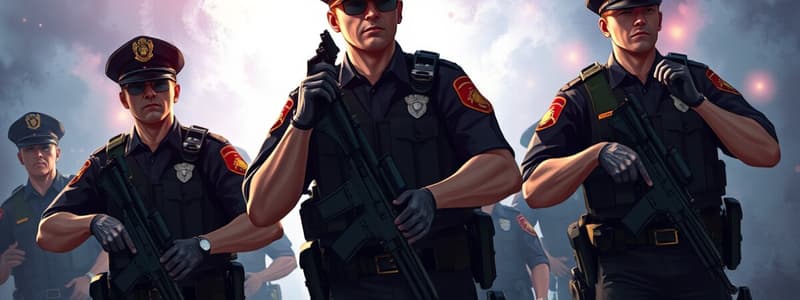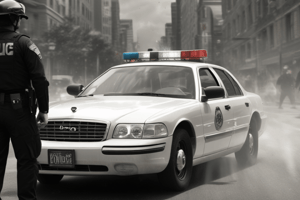Podcast
Questions and Answers
What is the main aim of the Police Training Officer (PTO) program?
What is the main aim of the Police Training Officer (PTO) program?
- To promote traditional policing techniques
- To develop static skills in new officers
- To focus solely on mechanical training
- To incorporate contemporary adult educational methods (correct)
What is a key criticism of conventional police training approaches as mentioned in the manual?
What is a key criticism of conventional police training approaches as mentioned in the manual?
- They involve a high level of creativity.
- They focus on mechanical training and rote skills. (correct)
- They emphasize community interaction.
- They discourage life-long learning.
Which philosophy is becoming more prevalent among progressive police agencies?
Which philosophy is becoming more prevalent among progressive police agencies?
- Community-Oriented Policing and Problem Solving (COPPS) (correct)
- Zero-tolerance policing
- Administrative procedural training
- Reactive and traditional policing methods
What does the manual highlight as essential for police training today?
What does the manual highlight as essential for police training today?
Who contributed to the development of the PTO program?
Who contributed to the development of the PTO program?
Which of the following is NOT a component of emotional intelligence?
Which of the following is NOT a component of emotional intelligence?
What is the primary purpose of the Learning Matrix for trainees?
What is the primary purpose of the Learning Matrix for trainees?
Which of the following Core Competencies is likely focused on managing relationships?
Which of the following Core Competencies is likely focused on managing relationships?
Among the Substantive Topics listed, which involves responding to urgent situations?
Among the Substantive Topics listed, which involves responding to urgent situations?
Which of the following is NOT included as a Substantive Topic in the Learning Matrix?
Which of the following is NOT included as a Substantive Topic in the Learning Matrix?
What is the purpose of the Weekly Coaching and Training Report (CTR)?
What is the purpose of the Weekly Coaching and Training Report (CTR)?
Who is responsible for completing the Weekly Coaching and Training Report (CTR)?
Who is responsible for completing the Weekly Coaching and Training Report (CTR)?
What is a requirement if two calls for service are included in the CTR?
What is a requirement if two calls for service are included in the CTR?
When can the trainee and PTO complete their portions of the CTR?
When can the trainee and PTO complete their portions of the CTR?
How much compensatory time can a trainee receive to complete the CTR?
How much compensatory time can a trainee receive to complete the CTR?
What training model is discussed in the manual?
What training model is discussed in the manual?
What is one of the key components of the Program Structure chapter?
What is one of the key components of the Program Structure chapter?
Which document details the duties of a Police Training Officer (PTO)?
Which document details the duties of a Police Training Officer (PTO)?
What assessment method is referred to in the evaluation weeks section?
What assessment method is referred to in the evaluation weeks section?
What is included in Appendix B of the manual?
What is included in Appendix B of the manual?
Which chapter outlines the phases of the training program?
Which chapter outlines the phases of the training program?
What element of training is described as 'Failing Forward'?
What element of training is described as 'Failing Forward'?
What is the primary focus of the Police Training Officer Program?
What is the primary focus of the Police Training Officer Program?
Which appendix contains examples of Learning Activities?
Which appendix contains examples of Learning Activities?
Which of the following is NOT a responsibility of the Program Commander?
Which of the following is NOT a responsibility of the Program Commander?
How long does the basic trainee PTO program typically take to complete?
How long does the basic trainee PTO program typically take to complete?
What is the duration of the training phase in the lateral trainee PTO program?
What is the duration of the training phase in the lateral trainee PTO program?
What is the purpose of the integration phase in both trainee programs?
What is the purpose of the integration phase in both trainee programs?
What happens if lateral trainees cannot manage learning on the lateral program schedule?
What happens if lateral trainees cannot manage learning on the lateral program schedule?
How long is the evaluation phase for the basic trainee program?
How long is the evaluation phase for the basic trainee program?
Which phase of training in the basic trainee program focuses on emergency response?
Which phase of training in the basic trainee program focuses on emergency response?
What is the length of the patrol activities phase for lateral trainees?
What is the length of the patrol activities phase for lateral trainees?
What does the basic trainee program include in terms of competencies?
What does the basic trainee program include in terms of competencies?
How long is the training phase in the basic trainee PTO program?
How long is the training phase in the basic trainee PTO program?
What is included in the debrief for both trainee programs?
What is included in the debrief for both trainee programs?
Which phase in the basic trainee program lasts the longest?
Which phase in the basic trainee program lasts the longest?
What is typically not covered by a single training manual for an agency?
What is typically not covered by a single training manual for an agency?
How many weeks does the mid-term evaluation last in the basic trainee program?
How many weeks does the mid-term evaluation last in the basic trainee program?
Flashcards are hidden until you start studying
Study Notes
Program Overview
- Police Training Officer (PTO) program incorporates contemporary adult educational methods and Problem-Based Learning (PBL) for effective police officer training.
- Designed for both basic and lateral trainees, the program ensures a foundation for lifelong learning and prepares officers for real-world situations.
- Basic trainee program duration is 16-17 consecutive weeks, while the lateral trainee program lasts 11-12 weeks, both including integration, training, and evaluation phases.
Training Structure
- The training structure includes phases:
- Basic Trainee (1-2 weeks integration, 12 weeks training, 3 weeks evaluation).
- Lateral Trainee (1-2 weeks integration, 8 weeks training, 2 weeks evaluation).
- Evaluation phases include midterm and final evaluations, with assessments structured around PBL exercises tied to real policing scenarios.
Substantive Topics
- Training encompasses various substantive topics critical to modern policing, including:
- Non-Emergency Incident Response
- Emergency Incident Response
- Patrol Activities
- Criminal Investigation
- Key core competencies include:
- Emotional Intelligence (self-awareness, stress management)
- Conflict Resolution
- Use of Force
- Report Writing
- Community-Specific Problems
- Legal Authority
Learning Matrix
- A Learning Matrix serves as a resource to track covered and remaining topics rather than a simple checklist.
- Focuses on police vehicle operations, leadership, cultural inclusivity, and problem-solving skills among other competencies.
Evaluation and Coaching
- Emphasizes continuous assessment through Coaching and Training Reports (CTR) instead of daily evaluations.
- Each week involves collaboration between trainees and PTOs, where the trainee writes comments on core competencies, while the PTO provides coaching feedback.
- Compensatory time allows trainees and PTOs to complete CTRs outside of shift hours, fostering reflection and responsibility in learning.
Key Principles of Learning
- Emphasizes “Failing Forward,” encouraging officers to view failures as learning opportunities.
- Problem-Based Learning exercises are integrated throughout training, promoting engagement and application of knowledge.
Appendices
- Supplemental materials include:
- Learning Matrix by Core Competencies
- Coaching and Training Report templates
- Problem-Based Learning exercises
- Call Activity Log
- Training Notes
Overall Philosophy
- Transitioning from traditional methods, the manual advocates for community-oriented policing and emphasizes adaptability to contemporary policing needs and societal challenges.
Studying That Suits You
Use AI to generate personalized quizzes and flashcards to suit your learning preferences.



